When thinking about whether or not to get a VPN, people are often worried about losing performance. Besides, with so many slow providers out there, you’ll be right to think about slow upload/download speeds, high ping, and a laggy experience.
In theory, VPNs will give you impenetrable security and ensure your anonymity at a small trade-off – slowing down your internet connection. So, do VPNs slow down your internet speed? Well, the answer is YES, but the whole topic is a bit more complicated than that.
Therefore, I’ll talk about how and why this is the case, as well as recommend to you some fast providers that won’t cause any trouble. If you’re thinking about getting a subscription and you have your doubts, I recommend staying with me.
Does a VPN Slow Down Your Internet Speed?
As explained, when using a VPN provider, chances are that your internet connection will take a toll. While many providers have gotten better in recent years, some of them – due to the lack of budget or whatever – fell short of fresh improvements.
Logically, these VPNs tend to slow down your internet speeds due to older protocols and poor server infrastructure. Overall, we can say that ALL providers will harm the performance, but some do that more than others.
Hence, the only solution to minimize (and even eliminate!) this issue is to get a fast VPN with the newest protocols and a big server infrastructure that allows for better and more stable performance.
Before I give you my recommendations, I just want to briefly explain the process and make you see why your speed is slower when using a VPN.
Why Does a VPN Slow Down My Internet?
If you know how a VPN works, you know that it routes your traffic through an encrypted tunnel, making it unreadable by your ISP or hackers. Moreover, the service does this by letting you connect to a remote VPN server, which is often located in another country – or continent!
Once you connect and visit the site you want, the connection must be decrypted before it reaches its destination. This process, as you can guess, has an impact on the speeds you get, due to the process of decryption.
Another factor is the aforementioned distance to the server. Connecting to a server very far from you makes your traffic “travel” longer before reaching its destination. The physical distance harms ping but also download/upload speeds.
For this reason, videos might take a while to buffer or you’ll simply have a 100+ ms ping in Fortnite or Warzone. If you’re wondering if a VPN will slow down your internet, you should also take into account the servers themselves.
Let me explain. More advanced providers like NordVPN, ExpressVPN, or CyberGhost have the best possible infrastructure – not just numbers-wise. Instead, they think of something called “server throughput” which limits the server in terms of performance.
Thus, they usually go for 10 Gbps servers, which provide the fastest performance and prevent overcrowding. Finally, I should mention the VPN protocols like OpenVPN and WireGuard or Lightway and NordLynx.
These protocols are much better than the old PPTP, SSTP, or L2TP protocols, which many providers already left aside. Thus, it’s easy to see why VPNs have gotten faster over the years – or at least some of them, that is.
VPNs that Don’t Slow Down Your Internet: our Top 3
If you don’t want a VPN to slow down your internet, or at least do it minimally, you should focus on the best-performing ones. Some of the fastest VPNs on the market can still impact your performance, but that impact is so negligible, that you won’t notice it.
Don’t believe me? Well, let me prove it to you. Today, I want to talk about 3 VPN providers that won’t slow down your internet connection, briefly present them to you, and even give you some of my test results.
1. NordVPN
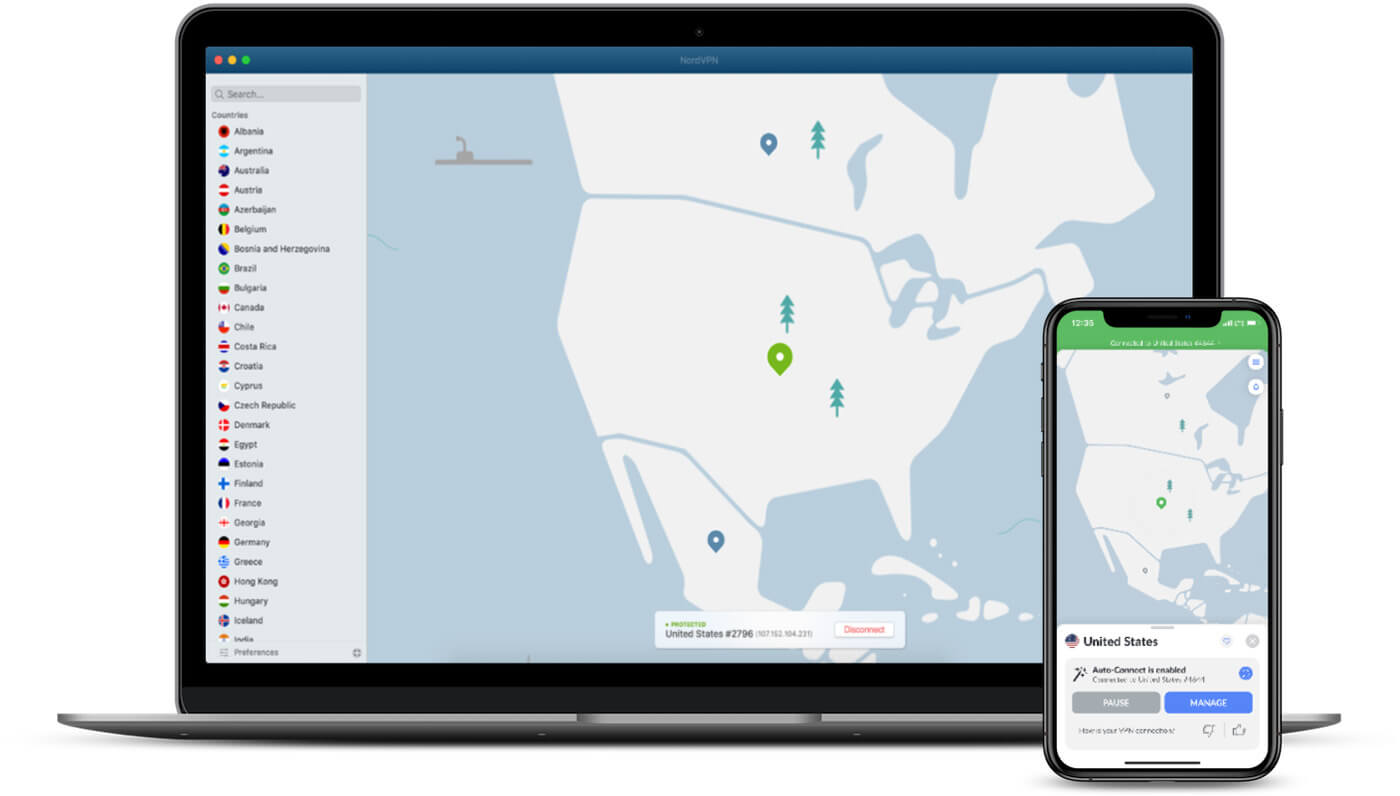
NordVPN is an impressively fast provider. Needless to say, it’s not a VPN that will slow down your internet speed that much considering the advanced tech that the company is known for. Much like ExpressVPN, NordVPN has a proprietary protocol.
This time, it’s called NordLynx and is based on WireGuard, which is already a great solution for improving speeds and performance. However, NordVPN did some tweaks to make it more secure, making it pretty much a perfect protocol that works flawlessly.
Its 7,200+ servers in 118+ countries are impressive, too, and NordVPN upgraded to 10 Gbps servers in 2021. This, once again, means that you get more stable performance, blazing-fast speeds, and no overcrowding that kills the internet speed.
With this in mind, NordVPN is an excellent choice for watching Netflix in 4K or enjoying P2P activities with no excessive speed losses. Even short connection times are a thing here, as NordVPN worked hard on this part.
Nevertheless, here are my speed test results of it (with the NordLynx protocol):
- Internet connection without NordVPN enabled: 12 ms | 116.12 Mbps | 12.64 Mbps
- Connected to NordVPN in the UK: 42 ms | 112.68 Mbps | 12.02 Mbps
- Connected to a server in the USA: 122 ms | 84.71 Mbps | 12.02 Mbps
- Connected to a VPN server in Australia: 331 ms | 67.28 Mbps | 11.69 Mbps
The values given are averages following numerous tests and are in this order: Ping | Download | Upload)
Once again, you can see that NordVPN displays blazing-fast speeds, being a bit faster than ExpressVPN, which is already pretty fast itself. This makes it the best choice if you are looking, for example, to watch American TV abroad.
2. ExpressVPN
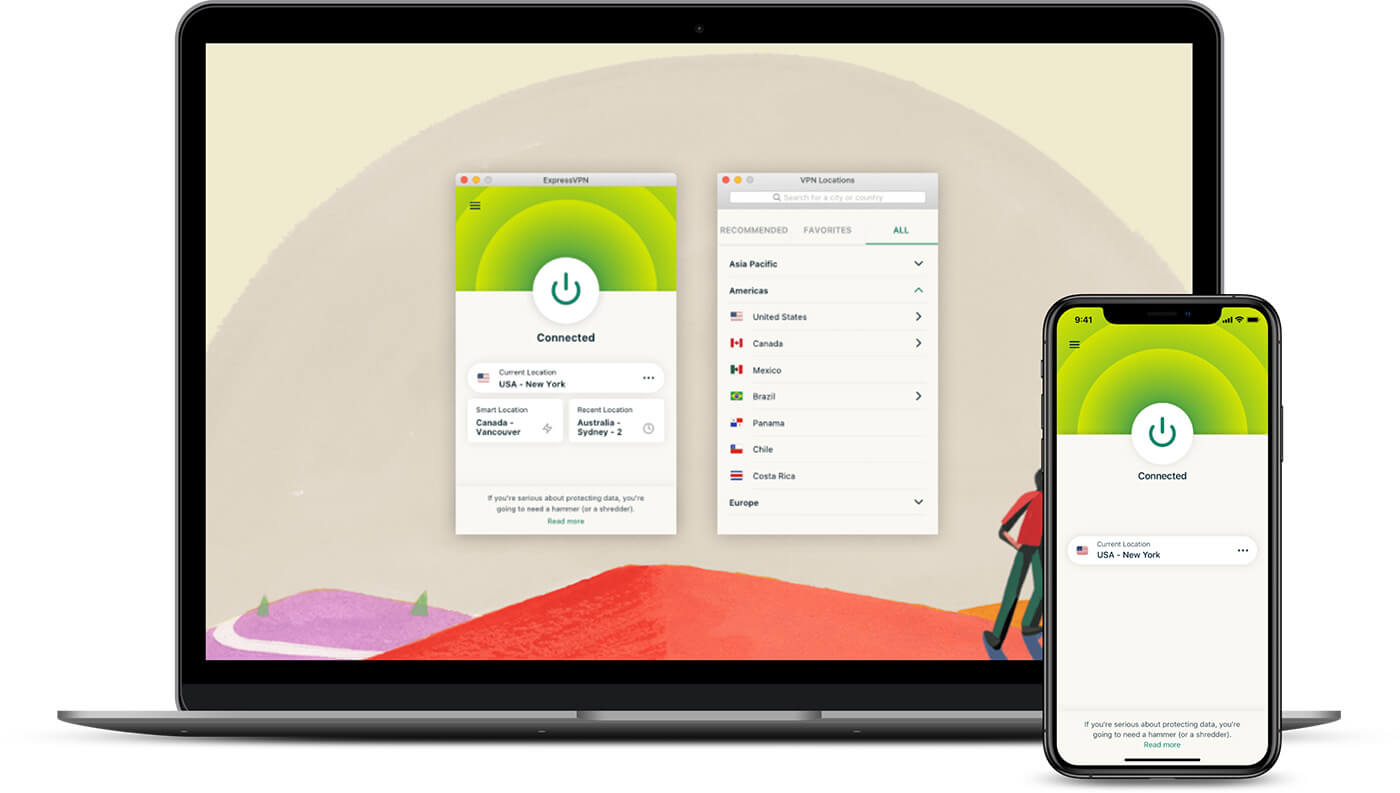
ExpressVPN comes in at a close second, right after its fierce rival NordVPN. For years, this provider has been known to deliver stunning performance, even before its proprietary Lightway protocol, which is a masterpiece in its own right.
ExpressVPN offers 3,000+ servers in 160 locations, so its server infrastructure is well thought out. On top of that, it offers 10 Gbps servers which are proven to provide faster speeds, stable connections, and general network improvements.
Even with its crowded network, ExpressVPN keeps its performance at the top level. The Lightway protocol does a great job here, as it’s made with improving speeds and offering better security in mind.
This makes ExpressVPN extremely suitable for streaming, fast torrenting, playing games online, and browsing the dark web smoothly regardless of other speed-decreasing parameters. Now, how fast is ExpressVPN, you might ask?
Well, just know that my native download/upload speeds are 130/60 Mbps and I’m from Eastern Europe, so I don’t have the fastest internet in the world. However, after doing several speed tests in several countries using Lightway, I got the results below.
- Internet connection without VPN protection: 12 ms | 116.12 Mbps | 12.64 Mbps
- Connected to a server in the United Kingdom: 42 ms | 109.96 Mbps | 11.77 Mbps
- Connected to a VPN server in the US: 122 ms | 84.13 Mbps | 12.06 Mbps
- Connected to ExpressVPN in Australia: 231 ms | 61.89 Mbps | 12.18 Mbps
As you can see, the difference is very low considering how far some of the servers really are.
3. CyberGhost
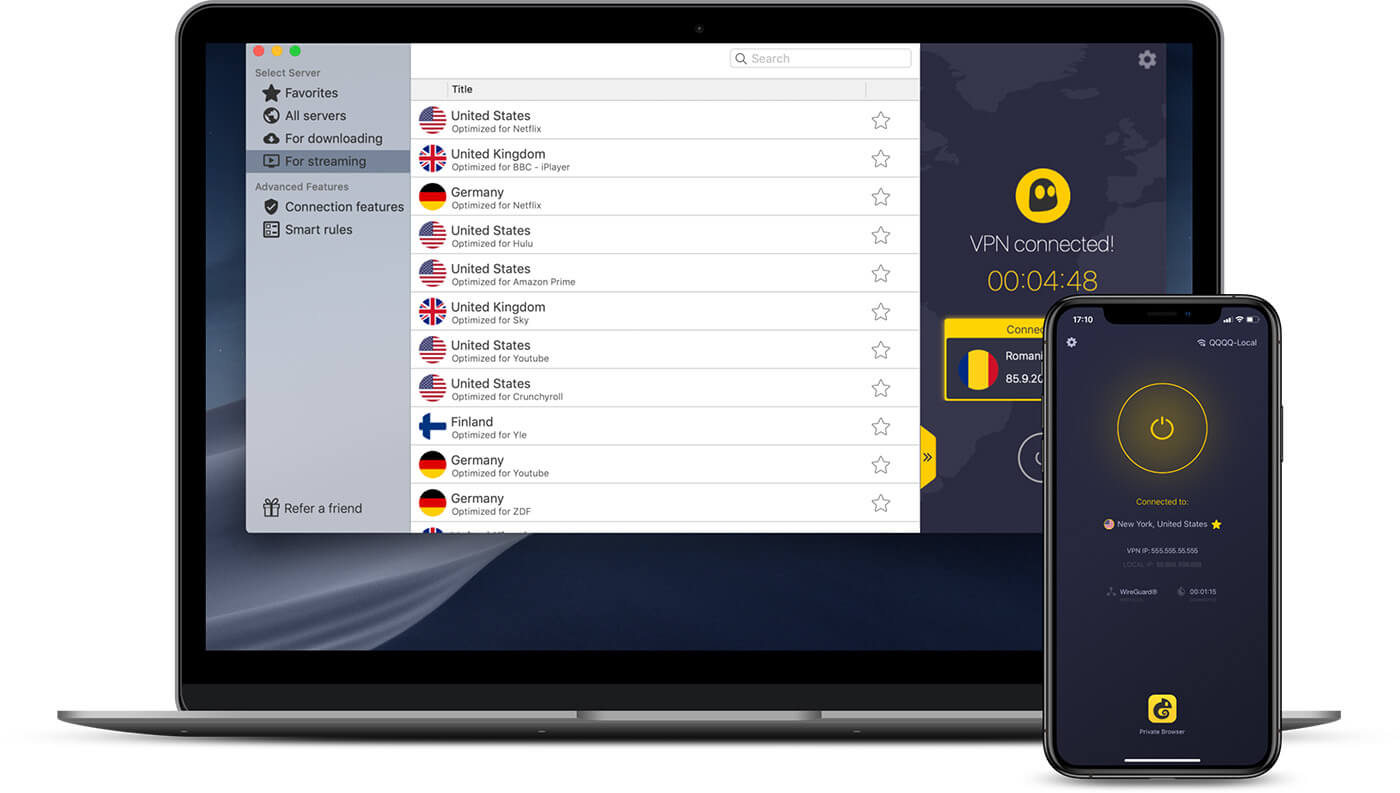
CyberGhost and its 10 Gbps infrastructure are here to bring about the best performance for the money. Indeed, this is a budget provider with 12,000+ servers in over 100 countries, giving you a huge, quality, and robust server park.
This provider’s large server fleet spawned streaming and torrenting servers, which make CyberGhost much more versatile. In terms of speeds, this is pretty much the best you can do if you’re looking for a pocket-change-priced provider.
CyberGhost offers the well-known WireGuard protocol that comes with fewer lines of code compared to OpenVPN, resulting in easier updates and improvements. And to be honest – CyberGhost did a lot of improvements here, especially in speed and stability.
Our tests showed that CyberGhost is a good performer in any scenario when using both OpenVPN and WireGuard. However, I did a few tests with WireGuard with some impressive test results:
- Internet connection without CyberGhost activated: 12 ms | 116.12 Mbps | 12.64 Mbps
- Connected to a VPN server in the UK: 42 ms | 99.59 Mbps | 11.82 Mbps
- Connected to CyberGhost’s server in the US: 114 ms | 83.49 Mbps | 10.38 Mbps
- Connected to a server in Australia: 266 ms | 68.48 Mbps | 11.81 Mbps
Even though a bit slower than NordVPN, even this cheap provider will not reduce your performance by more than 40%, and this is in extreme cases and very large distances.
Which Features Make a VPN Fast?
Despite VPNs functioning, more or less, the same, you’ll notice a few discrepancies between different providers. Some are slower, while some offer blazing-fast speeds across all servers. The question is – what makes a VPN fast? Why do some VPNs slow down your speed less than others?
To answer these burning questions, we’ll quickly go through the features that the fastest VPNs have.
- Modern protocols. Protocols like OpenVPN and IKEv2 are great but they’re outdated by today’s standards. NordVPN, ExpressVPN, and CyberGhost are equipped with top-of-the-line alternatives like NordLynx, Lightway, and WireGuard. They’re designed for speed and performance specifically, which explains why they’re so fast.
- Lots of servers. Overcrowded server networks will hurt the performance. That’s why having a big server fleet is vital. The more servers the VPN has, the smaller the chances of them being overloaded with users, as they’re more evenly distributed.
- 10 Gbps server infrastructure. Every fast VPN offers 10+ Gbps servers. These serves can handle 10 Gbps speeds and by extension, allow you to fully maximize your native internet performance. Free VPNs, in comparison, usually limit you to 1 Gbps servers, which explains why they’re slower.
Do Free VPNs Slow Down Your Internet?
Earlier in the article, I mentioned that all VPNs slow down your internet speed, with some more than others. Free VPN services for iPhone, Android, Windows, or any other device are very interesting because they promise one thing and they always under-deliver, especially when talking about speeds and performance.
So, does a VPN make your internet speed slow if you’re not paying for it? Yes, it does, and in this case, we’re talking about huge performance decreases that can go up to 80% in extreme cases.
Free providers offer 1 Gbps servers – or slower – with very small server fleets. When you have a small network and slow servers, overcrowding is imminent, upon which, none of the connected users will have a smooth browsing experience.
On top of everything, free providers are known to offer limited bandwidth. This, in conjunction with slow speeds, will give you a headache very often. In many cases, though, these free VPNs offer premium plans where they “behave” better.
Once you pay, they’ll unlock faster servers and give you more of them, along with access to better protocols, and streaming support. The takeaway is that using free providers leads to a significant slowdown in your internet speed.
Not every paid provider is fast either, but if you focus on the fast ones that I presented, you shouldn’t have any issues.
Some Fast Free VPNs You Can Try
Despite our negative approach to free VPNs in terms of performance, some of them are considered fast – not faster than premium VPNs. Unfortunately, these are very rare, as explained in our guide about free VPNs with solid speeds. They include:
Proton VPN
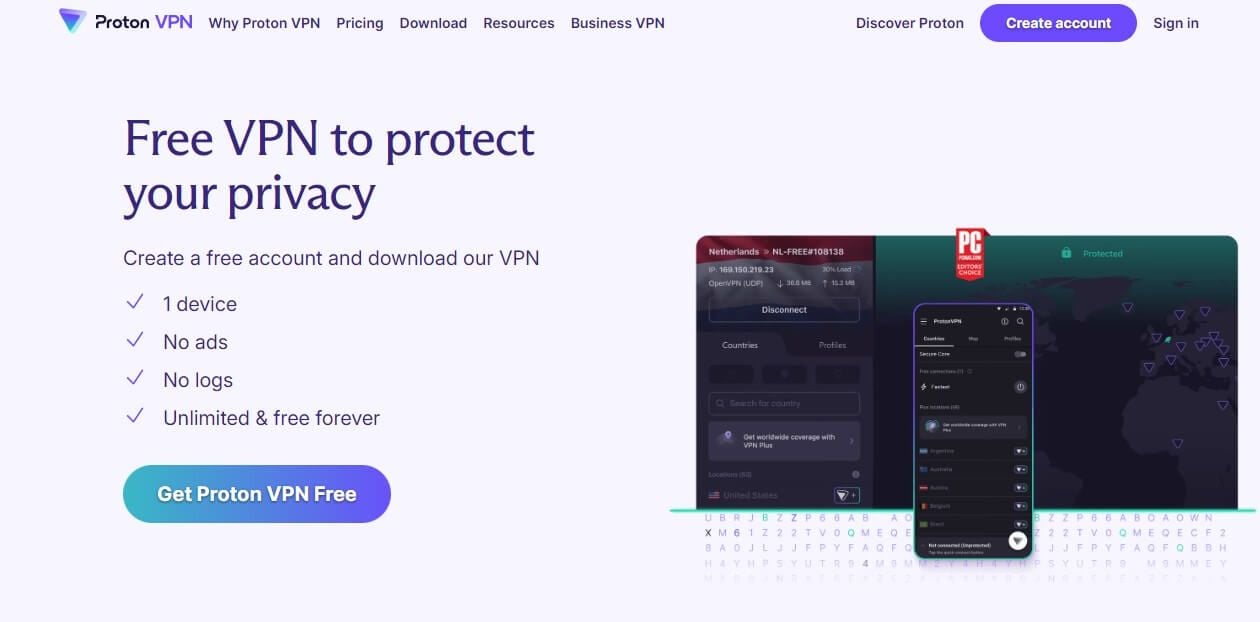
Proton VPN has a respectable free version with 10 Gbps servers and pretty stellar performance. This VPN is safe and secure, so it keeps no logs even if you’re a free user. While users get unlimited bandwidth and 5 server locations, the provider isn’t the fastest overall, which isn’t welcome for bandwidth-hungry activities.
We also found this VPN insufficient for watching Netflix or downloading torrents. Other downsides include the lack of simultaneous connections and no 24/7 live chat service for free or upcoming users. Don’t get us wrong – Proton VPN is fast for a free VPN.
But our speed test results show it’s way behind our preferred paid options.
PrivadoVPN
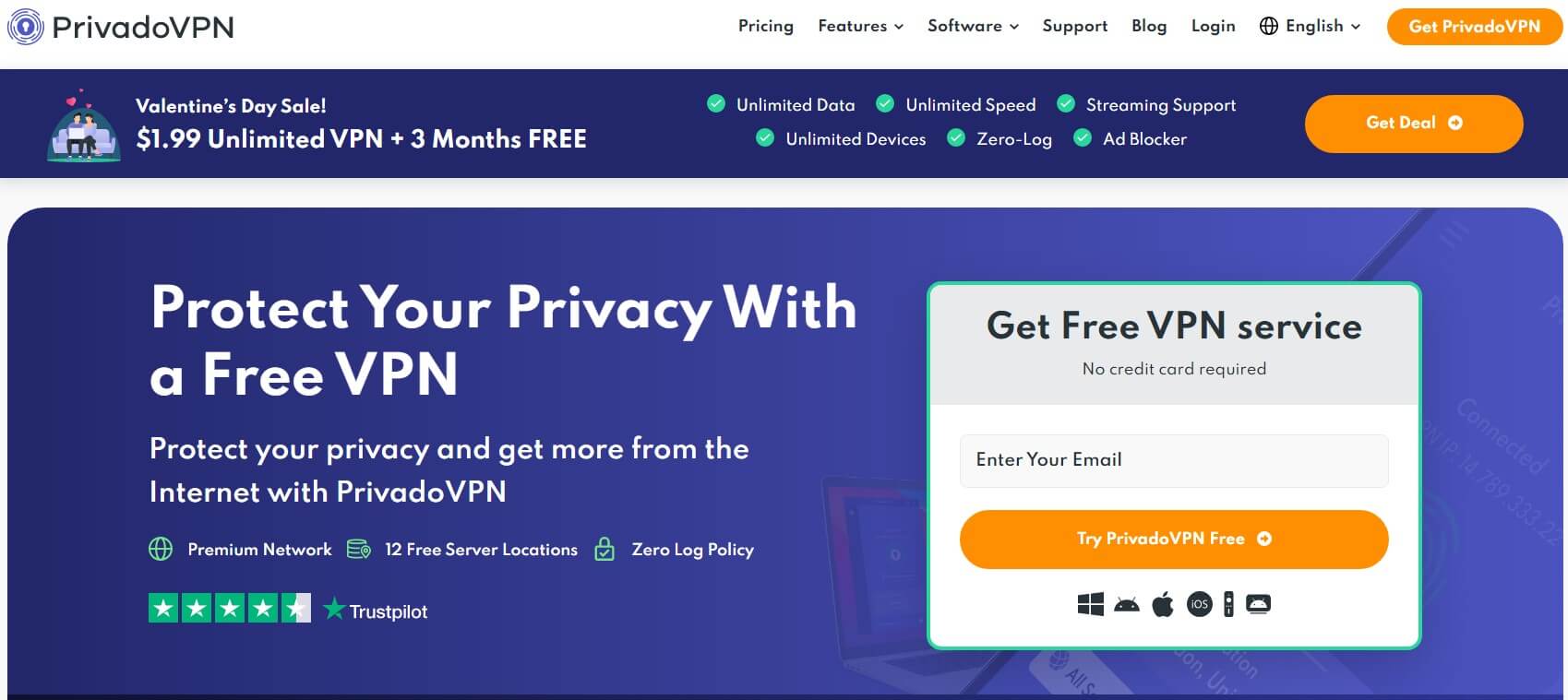
PrivadoVPN offers uncapped speeds in its free plan. It openly states that it uses 10 Gbps servers in 12 locations, making for a promising experience. Sadly, this VPN offers 10 GB of traffic a month, which is a shame considering it works with Netflix and fully supports P2P.
PrivadoVPN is indeed safe to use and it comes with a no-logs policy. Its easy-to-use apps are here for all major platforms but its free version lacks an ad blocker and other premium features. Like Proton VPN, this one uses WireGuard as its main protocol, which explains why it’s fast.
To Summarize
With everything you learned, it’s easy to conclude that a VPN slows down internet speeds, but the degree of this impact depends on the VPN service itself. If we’re talking about cutting-edge providers like NordVPN, ExpressVPN, or CyberGhost, the impact is barely noticeable.
Thanks to advanced protocols, lots of servers, and great server infrastructure, you won’t notice any difference while using any of them. As such, these providers are often the best options for gaming, watching 4K footage, downloading, and browsing.
FAQ
Finishing things off, let me answer a few important questions related to the topic.
📈 How to get better speeds with a VPN?
To get better speeds, it’s always recommended to use a fast protocol and a server close to you. Preferably, you want a server in your or neighboring country while using WireGuard, NordLynx (with NordVPN), or Lightway (with ExpressVPN).
In this scenario, you’ll practically have no speed losses and you’ll be able to enjoy native speeds with the added benefit of security and privacy.
🐇 What is the fastest VPN protocol?
The fastest protocol currently available is NordLynx and it’s available with NordVPN. However, Lightway and WireGuard protocols are great as well, with minor differences in speeds and stability.
⛔ Which VPNs should I avoid if I want fast speeds?
If speeds are your priority, you should avoid any free VPNs like Hola VPN, Betternet, Hotspot Shield, and many others. Keep in mind that even some premium VPNs tend to decrease your internet speed more.
Some of them include McAfee VPN, Proton VPN (check our Proton VPN review here), PureVPN, and dozens more. However, they’re still way faster than free VPNs.